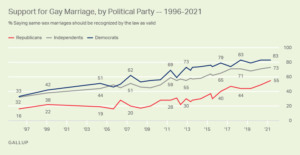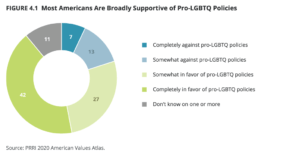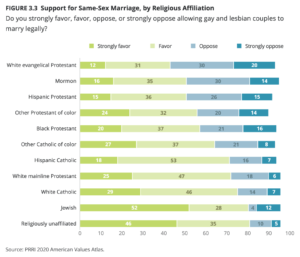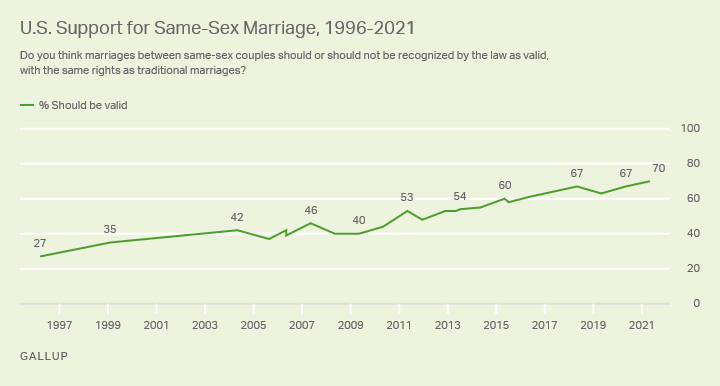Bipartisan support for same-sex marriage in America continues to soar forward, even while some state legislatures are attempting to enact a raft of other anti-LGBTQ bills.
Having lost their previous crusade against same-sex marriage, religious conservatives now are driving Republican legislative attempts to restrict LGBTQ rights in other ways, especially targeting transgender persons.
The venerated polling firm Gallup reports that 70% of Americans now support same-sex marriage, a new high in its polling since 1996. Current support marks a 10-point increase since 2015, when the U.S. Supreme Court ruled that all states must recognize same-sex marriages.
70% of Americans now support same-sex marriage.
That corresponds to data from Public Religion Research Institute, which last year found support for same-sex marriage has grown from one-third in 2007 to two-thirds today, and opposition has dropped from 55% to 27%.
In the six years since same-sex marriage became legal across the nation, more couples have tied the knot officially. However, same-sex marriages remain a distinct minority among all marriages in the U.S. Earlier this year, the Census Bureau reported there were 568,000 same-sex married couples in the U.S. in 2019. By comparison, there are 62 million married couples in the U.S.
Big shifts in Republican views
Last year, for the first time, a majority of Republican voters told PRRI they support allowing gay and lesbian couples to legally marry, up from 47% support in 2019. And that support continues to increase, according to Gallup, which found 55% of Republicans in 2021 suppor same-sex unions.
 In fact, Gallup said, the latest increase in overall national support for same-sex marriage “is driven largely by changes in Republicans’ views.”
In fact, Gallup said, the latest increase in overall national support for same-sex marriage “is driven largely by changes in Republicans’ views.”
And majorities of most religious groups support same-sex marriage, including 75% of white Catholics, 72% of white mainline Protestants, 71% of Hispanic Catholics, 51% of Black Protestants, 56% of other Protestants of color, and 51% of Hispanic Protestants.
Outliers in the research remain white evangelical Protestants, among whom 43% support same-sex marriage. Republicans as a whole are more likely to support same-sex marriage than are white evangelical Protestants, who largely identify as Republicans.
The bottom line, according to Gallup, is this: “Once opponents of legalization, Republicans have mostly come to back it. Court and legislative challenges to the legal status of same-sex marriage have simmered down since the Supreme Court issued its decision. Meanwhile, older U.S. adults, who were once holdouts in support for gay marriage, now come down on the same side of the issue as young adults. Gallup’s trend illustrates that Americans’ views can shift in a relatively short time span, creating a new consensus — even as polarization on other measures intensifies.”
Seeking more restrictions at state level
Those “other measures” include massive efforts to pass anti-LGBT bills in state legislatures this year, escalating an already existing trend.
A prime example of that is found in Texas, where the number of bills introduced to limit transgender rights has doubled to nearly 50 this year, including 17 bills offered during a 30-day special session called by Gov. Greg Abbott mainly to pass new voting restrictions that were blocked in the regular session by a walkout of House Democrats.
“The same fringe groups who fought and lost against marriage equality and bathroom access continue to use misinformation and false claims to target LGBTQ people and kids across the country.”
The Texas bills are among more than 250 anti-LGBTQ bills introduced in 33 states this year. The Human Rights Campaign reports that 25 of those bills nationwide were signed into law — the most in a year since the group began tracking the figures in 2015.
“This constitutes a national emergency,” Ricardo Martinez, HRC’s chief executive officer told Bloomberg. “And we don’t have to wait for these bills to be passed for them to cause harm.”
“The same fringe groups who fought and lost against marriage equality and bathroom access continue to use misinformation and false claims to target LGBTQ people and kids across the country,” Sarah Kate Ellis, president of GLAAD also told Bloomberg.
‘A complete reversal’ in 15 years
Natalie Jackson, director of research at PRRI, gave an interview to Cheddar News, where she explained that the rapid change in American attitudes on LGBTQ issues. Support for same-sex marriage “has undergone a complete reversal in the last 15 years. We’ve gone from 36% supporting it to 67% supporting it.”
 What she sees is an “incredible awakening to the issues that LGBTQ people face, and support for their rights and their struggles has just increased exponentially.”
What she sees is an “incredible awakening to the issues that LGBTQ people face, and support for their rights and their struggles has just increased exponentially.”
This has been driven, in part, she said, as “more people have begun acknowledging and recognizing LGBTQ people around them. It’s no longer a strange thing. It’s something more common that people have a lot more experience with than they did 15 years ago. And that humanizes them. That makes it oh, this is not this strange other thing, this is someone that I care about or someone that I know whose rights and whose freedom is at stake. And that humanization process makes people really shift their views.”
But clearly not all Americans have arrived at the same views, she added, noting that 51% support for same-sex marriage among Republicans — while a dramatic shift — “is barely a majority.”
“There’s a lot of space for that to continue moving in the support direction,” she said. “At some point, I do think we’re going to achieve saturation and there will be a core group of Americans for whom this is just not going to be something they support, you know, for religious reasons, for other reasons … . And it is possible that there’s just this core group who will never converge over to the favor side.”
Also, while more conservative states attempt to pass more restrictions on the LGBTQ community, other states have passed nondiscrimination laws, she added.
National opinions vs. ‘protecting the base’
If state and federal legislators voted according to the wishes of their broader constituencies and not just their partisan base, LGBTQ persons would enjoy more protections everywhere, according to PRRI data.
PRRI found that 76% of Americans favor laws that would protect lesbian, gay, bisexual and transgender Americans from discrimination in jobs, housing and public accommodation, only 19% oppose such nondiscrimination protections. And those who strongly favor protections (34%) vastly outnumber those who strongly oppose them (6%).
 More importantly, PRRI found: “Majorities of nearly every subgroup of Americans favor LGBT nondiscrimination protections, across race, age, religious, and partisan lines.”
More importantly, PRRI found: “Majorities of nearly every subgroup of Americans favor LGBT nondiscrimination protections, across race, age, religious, and partisan lines.”
Thus, national support for the Equality Act currently pending in the U.S. Congress is high, even while Republican legislators continue to block its adoption. The comprehensive equal-rights bill passed the House but remains stalled in the Senate due to unified Republican opposition.
Support for such protections is higher than any PRRI has recorded previously, including among Republicans, at 62%. However, the 38% of Republicans who do not favor LGBTQ protections most likely represent the highly energized base of the Trump-era party.
PRRI created an index of unfavorable views toward LGBTQ policies, including opposition to same-sex marriage, opposition to non-discrimination laws, and support for service refusals. The index breaks respondents into five groups based on their responses to these three questions.
Only 7% of Americans fall in the “completely against” category, and 13% fall in the “somewhat against” category.
White Christians make up 60% of those who are completely against pro-LGBTQ policies. The “completely against” group also tends to include older adults who are more likely to be Republicans who express favorable views of former President Donald Trump.
Related articles:
Baptist advocates for Equality Act say they are motivated by love of freedom as a faith virtue

